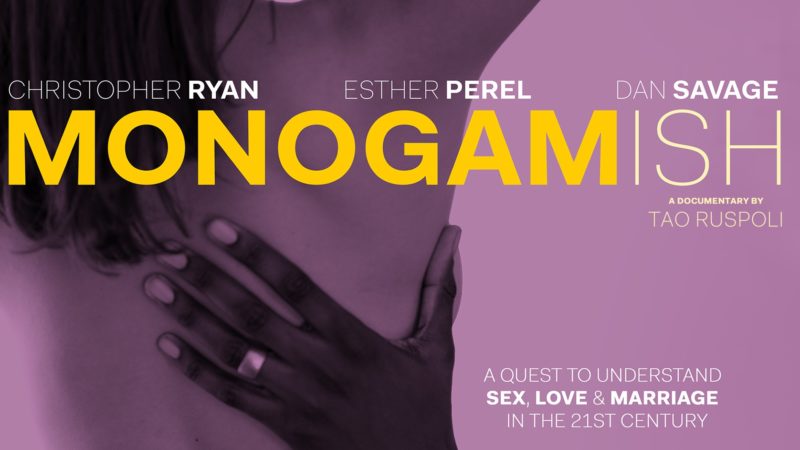Dan Savage's Definition of Monogamish - And More
In her TED lecture Esther Perel was ironic to observe the monogamy of today to be a far cry from its original meaning “one person for life” and to have in less than 100 years imperceptibly turned into monogamy serial model: one person at a time.
We shall refrain from duplicating statistics of the couples that malfunction in enduring even the serial model of monogamy filling the world with relationships destroyed by “infidelity”. But it looks like serial monogamy also bulges at the seams in its inability to satisfy all of partners’ desires and needs. While those daring to start a maximum open form of relationships – polyamory, swing, open marriage – number to 4-5% of couples only (in the United States).
It’s not about claiming the institution of the family to have become obsolete. A man of the XXI century has not ceased to be social and has not lost his need for close contacts. On the contrary: in the world of today most people have learnt to satisfy their basic needs thus becoming able to shift focus onto more sophisticated aspects of life – rejoice the sense of sharing one’s life with another person, relish pursuing common goals and take pleasure in having mutual interests.
However even a most idyllic case may turn a background for new ‘auxiliary’ relations – falling in love with new people, flinging and flirting. And any person prone to self-reflection might sooner or later wonder: “I like other people as well, they ignite my interest and admiration, so who am I? What type of relationship do I have if in addition to my primary partner there are other people I desire?”
Monogamish: who is it for?
Jessica O'Reilly, a sexologist, has suggested her scale of modern relationships that in between the extremes of “white” – a crystal clear monogamy – and “black” – the alternative relationships (polyamory, swing and so on) - places the main ‘bulk’ of the couples which relationships no longer fit the notion of “monogamy”:
- the couples in which either one partner or both of them lets third persons into their sexual fantasies and dreams;
- those discussing with their partners the feasibility of threesome or drawing scenarios and plans of rather adventurous experiments;
- those who have agreed on the “don’t ask, don’t tell” rule;
- those who have established their own rules of mutual sexual relationships with other people;
- and all those who consider themselves a couple in terms of emotions yet remain open to sexual experiments that feature the third parties.
"Monogamish" takes the stage

Known to have coined a number of neologisms in the field of sex, Dan Savage has found a definition of “not totally monogamous relationship” that he also attributed to his own couple. In 2011 he offered the notion monogamish relationship. Dan used the term not only to ridicule the relationship of his own but to give us a weapon for snickering at things we considered dramatic the day before.
Now that we understand ourselves to be not totally monogamous the menace of being called a ‘traitor” no longer hangs over. We can share things with our partner (even in case these things happen in our head only) – and we no longer break up the couple yet admit our monogamish nature. And it looks like the number of people whose relationships fall within the definition of monogamish is not that small.
The sarcastic issue about the term refers to indefinite position of the ‘monogamishes’. These are people who have already withdrawn from one extreme – absolute monogamy – yet have so far not succeeded in determining the kind of relations that fits them – i.e. those searching for their proper type.
Staying in the process of search is a state unusual in the world of quick decision making. The habit of choosing fast without several options considered and without one’s own variant worked out is the thing we suck in with mother’s milk. The selection of the trade, the university, the football team to support till the end of the days and the bank to deposit in forever must be done once-for-all-time. And those who decided to change the things already chosen shall be looked at with suspicion. So that they are only our sense of humor multiplied by confidence in our choice adequacy that may secure the stability of the transitional period.
Maybe they were the reflections similar to the above that prompted the authorities in the sphere of psychotherapy, sexology, family therapy and marriage to have formulated the term “monogamish” and to use it not only in their everyday activity but in articles, study works and TEDx presentations.
The term has appeared to be so apt that they made it a basic idea of a documentary – and you know it is not every word that they make a film aboutJ. The “Monogamish” movie project has already earned more than 50 000 USD on Kickstarter what makes us hope the production to be finished soon. The film comes in form of dialogues between the director and people considered iconic by everyone familiar with alternative relationship issue – Dossie Easton, Esther Perel, Dan Savage, Christopher Ryan and other contributors to global sex-positivity.
Who are not cut out for “monogamish”
Not every non-monogamous relationship can be called monogamish. One cannot define the relationships scale extremes with a new term, be it monogamy, infidelity or alternative relationships.
You are not monogamish in case in your couple:
- sexual contacts with third persons are concealed from the primary partner. This kind of relationship is referred to as non-consensual non-monogamy, or - simply put – infidelity;
- partners split after adultery and start new monogamous relationship – this is what we call serial monogamy;
- partners have not only agreed on having sexual contacts with the third persons but they also encourage emotional contact with new partners – this is ethical non-monogamy or alternative relationships where they distinguish between open marriage, swing, polyamory;
- the relationship features three and more persons with different levels of emotional and sexual involvement – threesome, squad, diad, triad.
Where does monogamish lead to?
Those willing to face the truth with humor and tell the partner “let’s admit us being monogamish” may feel relief from the newly coined type of relationship that does not come as a burden of commitments when dealing with friends and neighbors. Yes, we are a couple – the term means – but we live in compliance with our own rules so don’t expect us to behave like a traditional monogamous family.
Monogamish as a notion gives many couples a chance to cease living by non-fitting standards and start a joint quest to find answers to “What rules do we want in our family?”, “What do we consider to be normal and appropriate for us?”, “What is the balance between freedom and restrains in our relationships (no matter what name it shall bear)?”
People around may proceed to tell us about all the good that monogamy may bring yet there are no arguments against the versatility of human sexuality that was mentioned yet by A.Schopenhauer:
“A man can do what he wants but he cannot want what he wants”.
All we can do is rejoice the fact that having desire for or fantasy about a third person we instead of feeling shame are now able to realize our monogamish nature and smile )). This freedom of choosing one’s own rules also enables us to enjoy the feeling of compersion that we have dealt with in details in our article “Compersion – A New Word in Alternative Relationships”.
